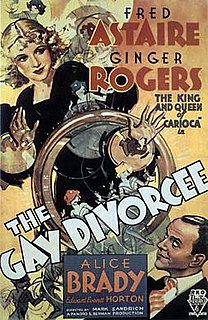
The Gay Divorcee is a 1934 American musical film directed by Mark Sandrich and starring Fred Astaire and Ginger Rogers. It also features Alice Brady, Edward Everett Horton, Eric Blore, and Erik Rhodes. The screenplay was written by George Marion Jr., Dorothy Yost, and Edward Kaufman. Robert Benchley, H. W. Hanemann, and Stanley Rauh made uncredited contributions to the dialogue. It was based on the Broadway musical Gay Divorce, written by Dwight Taylor, which had been adapted into a musical by Kenneth S. Webb and Samuel Hoffenstein from an unproduced play by J. Hartley Manners.

Footlight Parade is a 1933 American pre-Code musical film starring James Cagney, Joan Blondell, Ruby Keeler and Dick Powell and featuring Frank McHugh, Guy Kibbee, Hugh Herbert and Ruth Donnelly. The film was written by Manuel Seff and James Seymour based on a story by Robert Lord and Peter Milne, and was directed by Lloyd Bacon, with musical numbers created and directed by Busby Berkeley. The film's songs were written by Harry Warren (music), Al Dubin (lyrics), Sammy Fain (music) and Irving Kahal (lyrics), and include "By a Waterfall", "Honeymoon Hotel" and "Shanghai Lil".

With a Song in My Heart is a 1952 biographical film which tells the story of actress and singer Jane Froman, who was crippled by an airplane crash on February 22, 1943, when the Boeing 314 Pan American Clipper flying boat she was on suffered a crash landing in the Tagus River near Lisbon, Portugal. She entertained the troops in World War II despite having to walk with crutches. The film stars Susan Hayward, Rory Calhoun, David Wayne, Thelma Ritter, Robert Wagner, Helen Westcott, and Una Merkel. Froman herself supplied Hayward's singing voice.

Jack Selig Yellen was an American lyricist and screenwriter. He is best remembered for writing the lyrics to the songs "Happy Days Are Here Again", which was used by Franklin Roosevelt as the theme song for his successful 1932 presidential campaign, and "Ain't She Sweet", a Tin Pan Alley standard.

Dames is a 1934 Warner Bros. musical comedy film directed by Ray Enright with dance numbers created by Busby Berkeley. The film stars Ruby Keeler, Dick Powell, Joan Blondell, Guy Kibbee, ZaSu Pitts, and Hugh Herbert. Production numbers and songs include "When You Were a Smile on Your Mother's Lips ", "The Girl at the Ironing Board", "I Only Have Eyes for You", "Dames" and "Try to See It My Way".

Follow the Fleet is a 1936 American RKO musical comedy film with a nautical theme starring Fred Astaire and Ginger Rogers in their fifth collaboration as dance partners. It also features Randolph Scott, Harriet Hilliard, and Astrid Allwyn, with music and lyrics by Irving Berlin. Lucille Ball and Betty Grable also appear, in supporting roles. The film was directed by Mark Sandrich with script by Allan Scott and Dwight Taylor based on the 1922 play Shore Leave by Hubert Osborne.

"That Old Feeling" is a popular song about nostalgia written by Sammy Fain, with lyrics by Lew Brown. It was published in 1937.

Ziegfeld Girl is a 1941 American musical film directed by Robert Z. Leonard and starring James Stewart, Judy Garland, Hedy Lamarr, Lana Turner, Tony Martin, Jackie Cooper, Eve Arden, and Philip Dorn. The film, which features musical numbers by Busby Berkeley, was produced by Metro-Goldwyn-Mayer.

Samuel Howard Stept was an American songwriter who wrote for Broadway, Hollywood and the big bands. He became known simply as Sam Stept or Sam H. Stept – he rarely used his full middle name.

Colleen is a 1936 Warner Bros. romantic–musical film directed by Alfred E. Green. It stars Dick Powell, Ruby Keeler, and Joan Blondell.

Walter Wanger's Vogues of 1938 is a 1937 musical comedy film produced by Walter Wanger and distributed by United Artists. It was directed by Irving Cummings, written by Bella Spewack and Sam Spewack, and starred Warner Baxter and Joan Bennett. It was filmed in New York City in Technicolor.
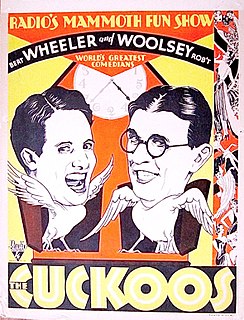
The Cuckoos (1930) is an American Pre-Code musical comedy film, released by RKO Radio Pictures and partially filmed in two-strip Technicolor. Directed by Paul Sloane, the screenplay was adapted by Cyrus Wood, from the 1926 Broadway musical, The Ramblers, by Guy Bolton, Bert Kalmar, and Harry Ruby. It starred, and although they had appeared on Broadway and in other films together, this was their first time starring as a team. The success of this picture, combined with Rio Rita being their most successful film of 1929, convinced the studio to headline them as the comedy team Wheeler & Woolsey, through 1937.

Three Sailors and a Girl is a 1953 Technicolor musical film made by Warner Bros. It was directed by Roy Del Ruth and written by Devery Freeman and Roland Kibbee, based on the George S. Kaufman play The Butter and Egg Man. Ray Heindorf was the musical director, with orchestrations by Gus Levene, and vocal arrangements by Norman Luboff. Choreography was by LeRoy Prinz.
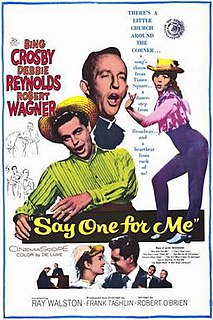
Say One For Me is a 1959 musical film directed by Frank Tashlin and starring Bing Crosby and Debbie Reynolds. Say One for Me was listed in the 1978 book The Fifty Worst Films of All Time. Actress Stella Stevens made her film debut in Say One for Me and received the Golden Globe Award in 1960 for New Star of the Year-Actress for this film.
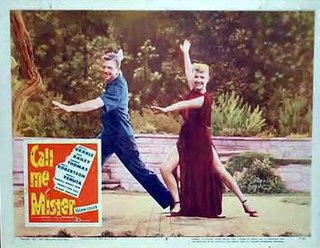
Call Me Mister is a 1951 American Technicolor musical film released by Twentieth Century-Fox. The feature was directed by Lloyd Bacon and re-written from the 1946 Broadway play version by Albert E. Lewin and Burt Styler with music by Harold Rome that featured cast members from the US armed forces.
The Life of the Party is a 1937 American musical comedy film produced by RKO. It was directed by William A. Seiter and starred Joe Penner, Gene Raymond, Parkyakarkus and Harriet Hilliard. It recorded a loss of $111,000.
Walt Disney Records: The Legacy Collection is a compilation album series produced and released by Walt Disney Records. The series commemorates distinct anniversaries of Disney films and the 60th anniversary of Disneyland, containing newly remastered versions of the original and expanded soundtrack albums. Each individual title features original artwork and illustrations by Walt Disney Animation Studios visual development artist, Lorelay Bové. A majority of the releases feature "The Lost Chords"; newly recorded tracks done in-house by Disney staff musicians of originally discarded songs and produced to sound period-appropriate to their album counterparts. The first entry in the series, dedicated to The Lion King, was released on June 24, 2014. The fifteenth volume in the series, dedicated to The Hunchback of Notre Dame, was released on September 22, 2021. A box set containing the first twelve-volume series was released on November 15, 2015.

Rookies on Parade is a 1941 Republic Pictures musical–comedy film that was the studios entry into the pre-World War II Army comedy genre. The Army technical advisor was Captain Jack Voglin who performed the same duty on the 1941 films You're in the Army Now, You'll Never Get Rich, and Buck Privates. The film was directed by Joseph Santley. Bob Crosby, Ruth Terry, Eddie Foy Jr., and Marie Wilson star.
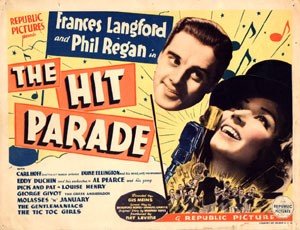
The Hit Parade is a 1937 American musical film directed by Gus Meins and written by Bradford Ropes, Samuel Ornitz and Harry Ruskin. The film stars Frances Langford, Phil Regan, Max Terhune, Edward Brophy, Louise Henry and Pert Kelton. The film was released on April 26, 1937, by Republic Pictures. Republic later reissued the film in 67 minute length as I'll Reach for a Star.
Jerome Lincoln Seelen was an American screenwriter and lyricist born March 11, 1912 in New York City and died September 12, 1981 in San Diego (California).

















